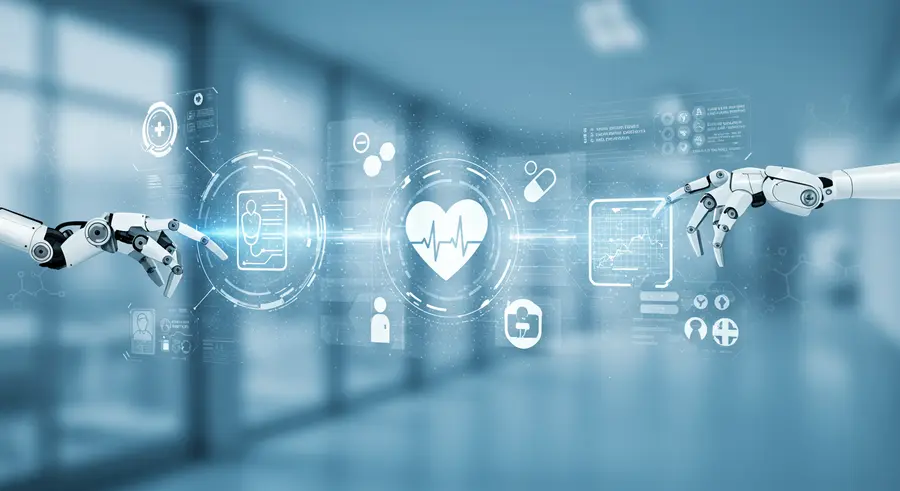RPA in Healthcare: Revolutionizing Patient Care and Operations

The healthcare industry is undergoing a significant transformation, driven by the need for greater efficiency, cost reduction, and improved patient outcomes. Robotic Process Automation (RPA) has emerged as a powerful technology poised to revolutionize healthcare operations by automating repetitive, rule-based tasks, thereby freeing up healthcare professionals to focus on more critical, patient-facing activities.
The Pressing Need for Automation in Healthcare
Healthcare providers face numerous challenges: an ever-increasing administrative burden, complex regulatory requirements, the need to manage vast amounts of patient data, and pressure to control costs while enhancing the quality of care. Manual processes in areas like patient registration, billing, claims processing, and data entry are often time-consuming, prone to errors, and can lead to staff burnout. This is where RPA steps in as a game-changer.
Key Applications of RPA in the Healthcare Sector
RPA offers a multitude of applications across the healthcare value chain, leading to tangible improvements:
- Patient Scheduling and Appointment Reminders: RPA bots can automate the process of scheduling appointments based on doctor availability and patient preferences. They can also send automated reminders via SMS or email, reducing no-shows and optimizing clinic schedules.
- Medical Billing and Claims Processing: This is one of the most impactful areas for RPA. Bots can automate data entry from patient records into billing systems, verify insurance eligibility, process claims, manage denials, and follow up on outstanding payments. This significantly speeds up the revenue cycle and reduces billing errors.
- Patient Data Management and EHR/EMR Automation: RPA can help in migrating and managing patient data across various systems, including Electronic Health Records (EHR) and Electronic Medical Records (EMR). Bots can update patient information, extract relevant data for reporting, and ensure data consistency and accuracy.
- Inventory Management for Medical Supplies: Hospitals and clinics can use RPA to track inventory levels of drugs and medical supplies, automate reordering processes when stocks run low, and manage supplier invoices, ensuring that essential items are always available.
- Report Generation and Compliance: Healthcare is a highly regulated industry. RPA can automate the collection of data and generation of various reports required for compliance with standards like HIPAA (Health Insurance Portability and Accountability Act). This ensures timely and accurate reporting, minimizing compliance risks. For more on healthcare regulations, you might refer to resources like the U.S. Department of Health & Human Services (HHS).
- Streamlining Pre-authorization Processes: Obtaining pre-authorization for medical procedures can be a lengthy process. RPA can automate the submission of pre-authorization requests, track their status, and notify relevant parties, accelerating patient access to care.
Transformative Benefits of RPA in Healthcare
The adoption of RPA in healthcare brings forth a spectrum of benefits:
- Enhanced Efficiency and Reduced Costs: By automating manual tasks, RPA significantly reduces processing times and operational costs associated with labor.
- Improved Accuracy and Reduced Errors: Bots perform tasks with high precision, minimizing human errors in data entry, billing, and claims processing, which can be costly and impact patient safety.
- Better Patient Experience: Faster appointment scheduling, quicker claims processing, and reduced administrative hurdles contribute to a more positive patient experience.
- Enhanced Staff Satisfaction: RPA alleviates healthcare professionals from tedious administrative work, allowing them to focus on patient care and more fulfilling tasks, which can boost morale and reduce burnout.
- Streamlined Compliance and Reporting: Automated data collection and report generation help healthcare organizations meet regulatory requirements more efficiently and accurately.
Key Considerations for RPA Implementation in Healthcare
While the benefits are compelling, successful RPA implementation in healthcare requires careful planning:
- Data Security and HIPAA Compliance: Protecting sensitive patient data is paramount. RPA solutions must be implemented with robust security measures and comply with HIPAA regulations.
- Integration with Existing Systems: RPA tools need to seamlessly integrate with existing healthcare IT infrastructure, including EHR/EMR systems, Picture Archiving and Communication Systems (PACS), and billing software.
- Change Management and Staff Training: Healthcare staff must be involved in the automation journey. Proper training and clear communication are essential to ensure smooth adoption and address any concerns.
The Future: Intelligent Automation in Healthcare
The convergence of RPA with Artificial Intelligence (AI) and Machine Learning (ML) is paving the way for Intelligent Automation in healthcare. This synergy will enable automation of more complex tasks, such as preliminary analysis of medical images, predictive analytics for disease outbreaks, and personalized treatment recommendations. The World Health Organization (WHO) often discusses the role of technology in advancing global health, and RPA combined with AI will be a key part of this future.
RPA is not just a technological upgrade; it's a strategic enabler for a more efficient, accurate, and patient-centric healthcare system. As the technology matures, its role in transforming healthcare delivery will only continue to grow, promising a future where administrative burdens are minimized, and the focus is squarely on patient well-being.